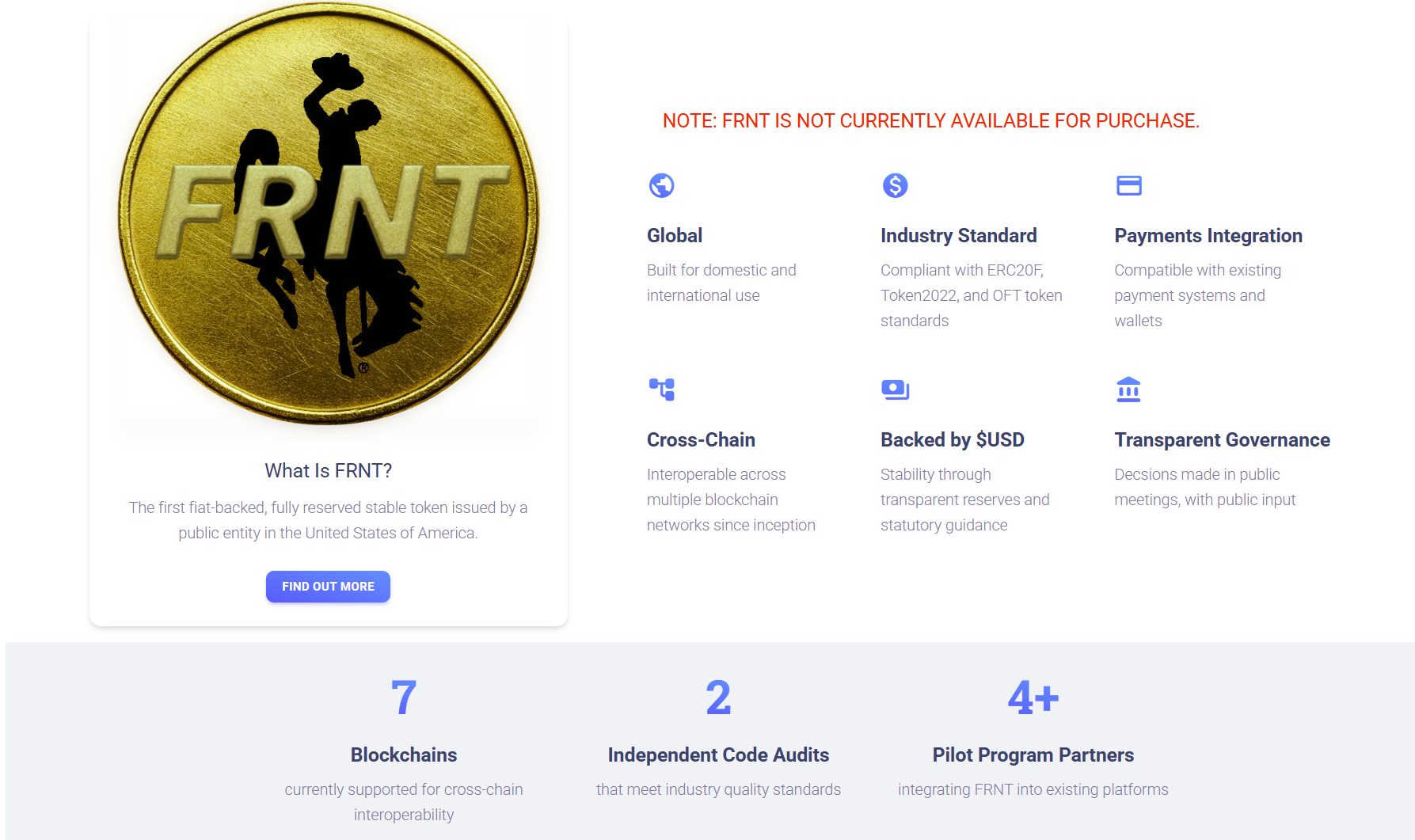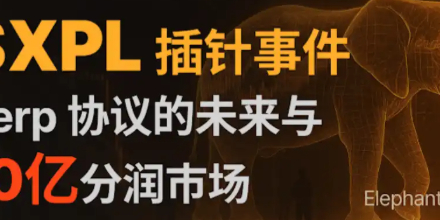Wyoming launches Frontier Stable Token FRNT on Ethereum, Solana, Avalanche, and more
Key Takeaways
- Wyoming has launched FRNT, the first state-issued, fully collateralized stablecoin in the US.
- FRNT enables fast, efficient government payments and is usable globally via Visa card platforms.
The Wyoming Stable Token Commission has launched the Frontier Stablecoin Token (FRNT) as the first dollar-pegged stablecoin issued by a US state government, which can be used for real-world transactions, according to a statement shared on Monday.
The Commission, created through the Wyoming Stable Token Act in 2023, provides governance and regulatory oversight for Wyoming’s pioneering stablecoin project.
As noted in the release, FRNT is built on Avalanche and stands out from other stablecoins as Wyoming law requires it to be overcollateralized, maintaining 102% reserves in short-term US Treasuries and dollars.
In addition to Avalanche, the token has been deployed on six other blockchains, including Arbitrum, Base, Ethereum, Optimism, Polygon, and Solana, according to the product page .
“While Wyoming has been the leading state for crypto, blockchain, and digital assets legislation for nearly a decade, the issuance of FRNT signals a paradigm shift,” said Anthony Apollo, Executive Director of the Wyoming Stable Token Commission. “In addition to regulation, public entities now have a model for innovation that can make government processes significantly more efficient.”

The state demonstrated FRNT’s utility in July 2025 through a pilot program with Hashfire, reducing government contractor payment timelines from 45 days to seconds, achieving a 99.9% efficiency improvement.
“The launch of FRNT marks the first in-production use case of a state-issued stablecoin in the United States, proving blockchain-powered government can be efficient, transparent, and designed for public good,” said John Wu, President of Ava Labs.
FRNT will be usable anywhere Visa is accepted, including through Apple Pay and Google Pay. The project combines oversight from the Wyoming Stable Token Commission, infrastructure from Avalanche, and fintech integration from Rain.
“Today’s launch is a powerful example of Rain’s mission in action. We build a financial infrastructure that makes stablecoins like FRNT instantly usable anywhere in the world,” said Farooq Malik, CEO & Co-founder of Rain.
Disclaimer: The content of this article solely reflects the author's opinion and does not represent the platform in any capacity. This article is not intended to serve as a reference for making investment decisions.
You may also like
XRP's Strategic Breakout: A Convergence of Legal Clarity, Institutional Momentum, and Mainstream Utility
- XRP's 2025 strategic breakout stems from SEC lawsuit resolution, ETF approvals, and institutional adoption, redefining its role as a foundational infrastructure token. - Legal clarity post-SEC dismissal enabled ProShares Ultra XRP ETF to attract $1.2B AUM, with 300+ institutions using RippleNet for cross-border payments. - Product innovations like EVM compatibility, MPTs, and on-chain lending tools expanded XRP's utility in DeFi and traditional finance, reducing transaction costs by 70% for banks. - Whal

The CFTC's Leadership Vacuum and Its Impact on Crypto Regulation
- CFTC faces regulatory limbo with only one confirmed commissioner, delaying crypto market oversight and creating compliance uncertainty. - Brian Quintenz's controversial nomination, linked to CFTC-regulated Kalshi, risks politicizing crypto regulation and deepening enforcement gaps. - Investors face dual risks: delayed rulemaking and enforcement weaknesses, but also opportunities for DeFi firms and RegTech providers in regulatory gray areas. - Bipartisan fragmentation threatens policy divergence, while st

Earn $16 million in a few minutes, millions liquidated: Full analysis of the XPL incident
On August 26, a massive buy order for XPL on Hyperliquid swept the order book, triggering a chain liquidation and causing the price to surge by 200% in a short period. A whale profited over $16 million, while short sellers suffered heavy losses. The incident exposed structural flaws in the order book model: low liquidity makes it vulnerable to manipulation, and liquidations create a positive feedback loop with price movements. This reflects a common risk in DeFi perpetual contracts, highlighting the need to improve protocol design through preemptive risk controls and spot pool linkage, in order to balance risk and reward distribution. Summary generated by Mars AI. The content generated is still being iteratively updated for accuracy and completeness.

Swallowing 7% of Circulating Supply: How Are Bitcoin ETFs Quietly Reshaping the Market Supply Structure?
Bitcoin ETFs have become a key force in reshaping market supply and demand, now holding over 1.4 million BTC (more than 7% of total circulation). Their capital flows reveal investor behaviors of chasing gains and cutting losses. New indicators, such as cumulative flow difference and flow-weighted average price, help analyze market sentiment and cost basis. As ETFs are absorbing BTC far faster than new coins are mined, long-term scarcity may intensify, though short-term fluctuations are still influenced by retail investor psychology. These tools offer innovative perspectives for understanding market dynamics. Summary generated by Mars AI This summary was generated by the Mars AI model, and the accuracy and completeness of its content are still being iteratively updated.

